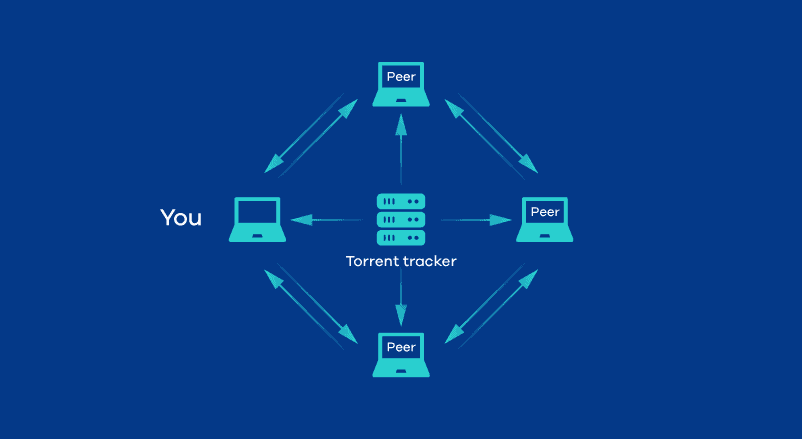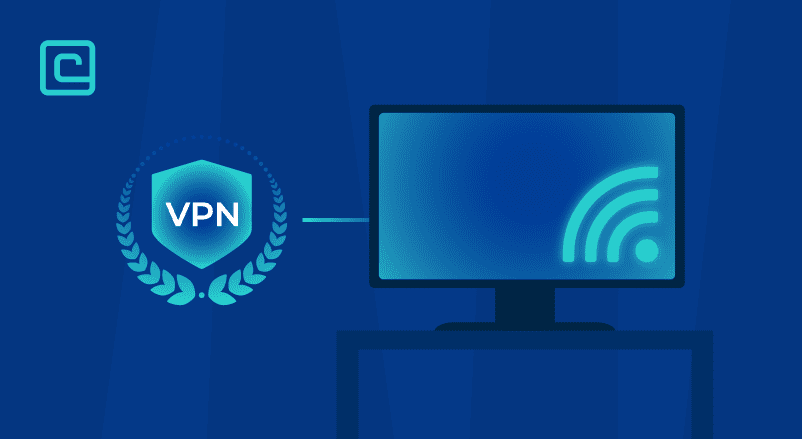What is Torrenting?

Torrenting is a popular way of sharing files over the internet that has gained popularity in recent years due to its speed and efficiency. However, it can also be a confusing and even intimidating concept for those who are new to it. Moreover, torrenting is often associated with illegal activities.
But, don’t worry, as you’ve come to the right place. We’ll explore the fundamentals of torrenting, the key terms, benefits and risks, and other must-know information. By the end of this guide, you’ll have a solid understanding of what torrenting is and how to get started with it safely and effectively.
What is Torrenting?
Torrenting is a method of file sharing in which large files are broken down into small pieces and distributed among a network of users. So, instead of downloading from a centralized server, users can download and upload pieces of the file from and to each other, with all of their devices connected to the same network. This allows for faster and more efficient downloads.
The process of downloading and uploading a torrent file in small parts is called “swarming”. It allows faster and more efficient downloads compared to traditional downloading methods, which rely on a single server to send the entire file to each user.
What is a Torrent?
A torrent is a type of file that contains information about a larger file or set of files. It allows users to download the larger shared file from multiple sources simultaneously using a peer-to-peer (P2P) network.
What is a Torrent Client?
A torrent client is a software program that lets users download and upload files using the BitTorrent protocol. It works by connecting to a network of other users who are sharing the file and downloading the file in pieces from those users.
A torrent client is responsible for managing the downloading and uploading of file pieces. When a user wants to download a file using a torrent client, they first need to obtain a “torrent file” or a “magnet link” for that file.
This file contains information about the file to be downloaded, such as its name, size, and the addresses of other users who are currently sharing it.
BitTorrent clients come in various forms. You can download desktop applications like uTorrent, BitTorrent, qBittorrent, and Deluge. Additionally, you can also use web-based torrent clientS such as BitLet or Seedr.
Depending on the specific torrent client you pick, you will find advanced features in your client. This can range from anything like scheduling downloads and setting upload and download speed limits to integrating with media players.
Test Your VPN Knowledge – Take A Quiz!
How Does Torrenting Work?
Torrenting operates through a P2P network, where a torrent file or ‘tracker’ is downloaded by a torrenting client. The client uses the tracker to identify other computers that hold the actual file being downloaded. Once you start downloading, the client gradually ads portions of the shared file to your own computer.
While the user downloads several pieces, they also share packets they have already downloaded with others in a similar position. This effectively turns their computer into a small server. That way, those sharing the file act as small servers for downloading the file.

What is Peer-to-Peer?
Peer-to-peer (P2P) is a type of communication and file-sharing system used by BitTorrent and other torrenting protocols. In a P2P network, individual users, or “peers”, connect to each other directly, rather than relying on a central server to manage communication.
Because P2P networks rely on direct communication between users, they can be more resilient and scalable than other types of networks. If one user goes offline or leaves the network, the remaining users can continue to share the file among themselves.
However, this doesn’t come free of any drawbacks. Because P2P networks are decentralized, they can be more difficult to control and monitor than other types of networks. This has led to concerns about the use of P2P networks for illegal activities, with one of the most significant ones being the sharing of copyrighted content.
What Are Seeders and Leechers?
In BitTorrent file-sharing, a “seeder” is a user who has a complete copy of the file being shared and is currently uploading it to other users. A “leecher”, on the other hand, is a user who is currently downloading the file from other users and does not yet have a complete copy.
In order for a file to be downloaded using BitTorrent, there must be at least one seeder available on the network. This is because a seeder is the only source for the complete file. Anyone who wants to download the file, they need one or more seeders in order to assemble a complete copy. The more seeders are for a file, the
Once a leecher has downloaded a complete copy of the file, they can become a seeder and can begin uploading the file to others who are still downloading. This helps maintain a healthy balance of seeders and leechers on the network. In turn, this ensures that download speeds remain fast and that the file remains available to others.
What is a Torrent Tracker?
A torrent tracker is a server that helps coordinate the communication between peers in a BitTorrent file-sharing network. The tracker keeps track of which users have downloaded and uploaded parts of the file and helps connect peers to each other so they can share those parts.
It does this by providing the IP addresses and port numbers of other peers in the swarm to each user’s client. In other words, the tracker acts as a sort of a search engine for the torrent, enabling users to find and connect to the right peer machines.
The tracker also helps manage the flow of data between peers, ensuring that each user is receiving and sharing different parts of the file in a way that maximizes download speeds and reduces redundancy. There are two types of trackers—public and private.
Public vs. Private Trackers
Public trackers are open to anyone and do not require authentication or registration to access. Almost every popular torrent site falls into this category. When using such a site, you can download and upload files without any moderation.
Because of this, content available on public trackers may not always be high-quality, and it may be difficult to find less popular or niche content. Additionally, when you download from public trackers, it’s crucial to verify that the torrent file is safe before you press the download button.
Public trackers are also more likely to be monitored by copyright holders and can be subject to takedowns and legal action. This is a major reason why you should always keep your IP address hidden when torrenting.
Private trackers, on the other hand, are restricted to members who have been invited or have passed a screening process. They often have higher standards for the quality of the content shared, and may specialize in specific genres or types of content.
Private trackers tend to have fewer users and seeders. But the ones that are present tend to be more reliable. This enables them to offer both faster upload speed and download speed.
Private trackers also have more control over their user base and can enforce rules to prevent abusive or illegal behavior. However, access to these trackers can be limited. For example, users might be expected to maintain a good ratio of uploads to downloads to avoid being banned.
To put it in simpler terms, the choice between private and public trackers depends on the user’s needs and preferences. Public trackers are more accessible and have a wider selection of content, but may have lower quality. Private trackers offer higher quality content and a more reliable network but may be harder to access and have stricter rules for sharing files.
With that said, the legality of your activities doesn’t depend on whether you’re using private or public trackers. The law is the same for both. If you’re if you exchange data that’s protected by copyright, you’re engaging in piracy, no matter in which of these two groups you do it.
Is Torrenting Legal?
Torrenting, or the use of the BitTorrent client for sharing and downloading files, is not inherently illegal. However, the legality of torrenting depends on what you’re downloading. Sharing and downloading copyrighted material, such as music, movies, or software, without permission is illegal in most countries.
This is known as piracy and is a violation of copyright law. In case you get caught, you could face fines, lawsuits, or even jail time. Torrenting laws vary from country to country, so the overall legal threat level will mainly depend on your location.
If you download copyrighted material, the holders might sue you for engaging in Internet piracy and downloading illegal files. Moreover, copyright trolls often prey on BitTorrent users to enforce copyrights on those who share files and pirated content.
On the other hand, torrenting legal files that are in the public domain is perfectly normal and permitted in most countries worldwide. For instance, you can use an open-source BitTorrent client to download Linux distros.
You can also use a BitTorrent client to legally torrent public domain media, open-source software, content with expired copyrights, and files that other users want to share for free. Torrenting is also a great solution for lessening loads from a central server by having the users simultaneously take up the role of hosts.
Is It Safe to Download Torrents?
Downloading torrent files can be risky because some torrents may contain malware or other malicious software. Of course, this isn’t to say that all torrents are harmful or illegal. There are also many legitimate torrents.
To stay safe when downloading, it’s important to use reputable torrent sites, verify the integrity of torrents before downloading, and keep your security software up to date. In that sense, the safety of downloading torrents depends on the content you are downloading and how you go about downloading it. It’s always best to exercise caution and use your best judgment when you download a particular torrent file.
How to Torrent Safely
There are a few steps you can take to ensure you’re safe when downloading and uploading files on torrent sites. Here are three helpful tips on how to stay safe when torrenting:
Use a VPN Service
No matter what kind of torrent files you want to add to your torrent client, there are several reasons why you should use a VPN when torrenting. Many torrent users rely on VPN protection when downloading files. Here’s why you should use a P2P VPN when torrenting:
- Privacy – When you download torrent files, Internet service providers can see all of the file sharing that’s going on. A VPN encrypts your Internet connection and hides your online activity, so even your Internet service provider can’t see what you’re doing.
- Security – Torrenting can be risky because you are downloading files from other users, who could potentially infect your device with malware or viruses. A VPN helps to protect your device by encrypting your internet traffic and hiding your real IP address.
- Bypassing Restrictions – Some countries around the world deem torrenting illegal. VPN services allow you to access torrent websites and download files from anywhere in the world, bypassing any geographical restrictions.
- Improving Download Speeds – Torrenting can often be slow, especially if the torrent is popular and many users are downloading the same file. Connecting to a VPN server can improve your torrenting speed by connecting you to a server closer to the source of the file, reducing the distance that your data needs to travel.

| 🌐 Website: | nordvpn.com |
| 🏢 Headquarters: | Panama |
| 📍Servers/Countries: | 5800+ servers in 60 countries |
| ₿ Accepts Cryptocurrency | Yes |
| 💸 Deals & Coupons | Get 68% off + 3 months extra |
Use Trusted Antivirus Software
Apart from using a trusted VPN service, you should also consider using an antivirus. While a VPN will keep your IP address private, it doesn’t protect you from any malware or viruses in the torrent file itself.
With this in mind, antivirus software can scan the files you download and detect any malicious content, preventing it from infecting your device. A good antivirus program provides real-time protection by continuously monitoring your device for any signs of malware or viruses. This helps to catch any threats before they can cause harm to your device.
Additionally, antivirus software can help to prevent identity theft by detecting and blocking any malicious activity that attempts to steal your information. It can also protect you against ransomware by detecting and blocking any malicious activity.
Only Download From Reputable Torrent Sites
Downloading from reputable torrent sites helps to ensure that you are downloading a safe and virus-free file. These sites often have a community of users who monitor and validate the files that are uploaded, making it less likely that you will download a file that contains malware or other harmful software.
For instance, downloading files from The Pirate Bay is a great way to go about it when using torrenting websites. Additionally, look for users who have many uploads and a long presence on the platform. They are more trustworthy and less likely to upload malicious files.
Downloading Torrents FAQs
What is a seedbox?
A seedbox is a high-speed, remote server that is used for torrenting. It is designed specifically for uploading and downloading large files, such as movies, music, and software, using the BitTorrent protocol. The main advantage of using a seedbox is that it provides a fast, secure, and anonymous way of torrenting.
What is BitTorrent?
BitTorrent is a P2P file-sharing Internet protocol that enables users to share large files, such as movies, audio files, and software, with each other over the internet. It is one of the most popular file-sharing protocols in use today and is widely used for both legal and illegal file sharing.
Can you go to jail for illegal torrenting?
Yes, in some countries, illegal torrenting can result in criminal charges and potential jail time. The severity of the punishment varies depending on the country and the circumstances of the case. But, it is possible to be charged with copyright infringement, which can result in fines and even jail time in some cases.
In the United States, for example, copyright infringement is considered a federal crime and can result in hefty fines and a maximum prison sentence of 5 years for each instance of infringement. If you are unsure about the legality of torrenting in your country, it is best to learn more on this topic before you download or share any files.
Cybersecurity and VPN researcher

